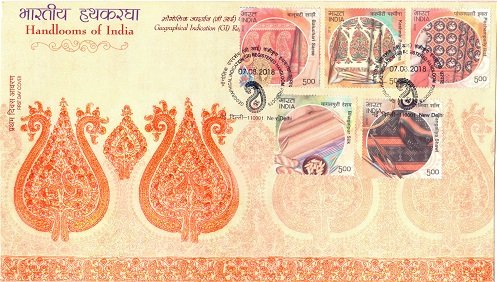Pochampally Ikat

Technical Data
| Stamp Set | Handlooms of India |
|---|---|
| Date of Issue | August 7, 2018 |
| Denomination | Rs. 5 |
| Quantity | 606,000 |
| Perforation | 14¼ x 14¼ |
| Printer | Security Printing Press, Hyderabad |
| Printing Process | Wet Offset |
| Watermark | No Watermark |
| Colors | Multicolor |
| Credit (Designed By) | Shri Kamleshwar Singh Smt. Alka Sharma |
| Catalog Codes |
Michel IN 3426 Stamp Number IN 3046 Yvert et Tellier IN 3115 Stanley Gibbons IN 3520 |
| Themes | Textile |
The Art of Patterns Woven in Time
Origin and Heritage
Pochampally Ikat comes from Bhoodan Pochampally in the Yadadri Bhuvanagiri district of Telangana. This exquisite handloom tradition has been passed down through generations, making it a significant GI-tagged handloom product. The craft represents centuries of skill, culture, and community artistry.
Unique Weaving Technique
Pochampally Ikat is renowned for its resist-dyeing method. Skilled artisans tie and dye sections of yarn according to a pre-determined color scheme before weaving. The tied sections resist the dye, while exposed areas absorb it, creating intricate geometric and floral patterns. When woven, these dyed yarns form designs that are vibrant, precise, and strikingly detailed.
Cultural Significance
Every Pochampally Ikat saree or textile tells a story. Beyond being a garment, it reflects the heritage, creativity, and craftsmanship of Telangana’s weavers. The motifs and colors often mirror local traditions, festivals, and artistic sensibilities, making each piece a living piece of cultural history.
Recognition and Legacy
Over the years, Pochampally Ikat has become a symbol of Indian textile excellence. Its intricate patterns and superior quality have earned recognition both nationally and internationally. By featuring it on Indian Handloom Stamps, the Department of Posts celebrates this timeless tradition, highlighting the rich legacy of GI Handloom Products for collectors and enthusiasts alike.
First Day Cover


Leave a Comment
You must be logged in to post a comment.